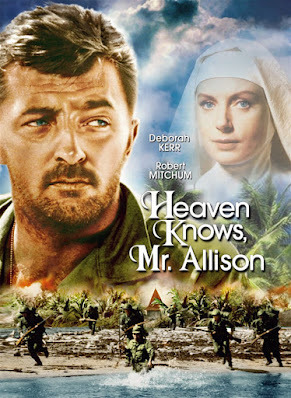Getting to Know “Heaven Knows, Mr. Allison”

I suppose it’s part of somedivine plan that I watched Heaven Knows, Mr. Allison on Good Friday.This 1957 film certainly reflects its era: it’s a widescreen romanticdrama populated by major stars (RobertMitchum and Deborah Kerr), using World War II as a backdrop for a tale of loveand sacrifice. One of its two central characters is a Roman Catholic nun, and formalreligion is treated with all due respect. Sentimental? Yup—but also anappealing reflection of an era when (at least in theory) men were men, andwomen were decidedly not.
Adapted from a popular novelby an Australian author, Heaven Knows, Mr. Allison, was directed as wellas co-written for the screen by the great John Huston. His filmography was longand varied, but this film most reminds me of 1951’s The African Queen,which contains a similar sense of opposites attracting under dangerouscircumstances. In The African Queen, a prissy missionary (KatharineHepburn) and a rough-and-ready ship’s captain (Humphrey Bogart) bond while on alife-or-death wartime journey down an African river.
Heaven Knows, Mr. Allison is set in a similarly dangerous time and a similarlyexotic place. It takes place on a small Pacific island during the later yearsof World War II. We open with a desperate American Marine, the only survivor ofa Japanese attack, reaching the shore in a rubber raft. Fortunately, the enemyis not present. The island’s sole inhabitant turns out to be a pretty youngBritish nun with her own tale of woe. The only surprise about this meet-cute isthat Allison has no apparent beef against the Church, and from the start treatsthe coiffed and veiled sister with full respect. When it comes to survivaltactics (like catching a giant sea turtle for dinner), he’s endlessly capable,and she’s hardy enough to go along with his every scheme. Once a Japanesesquadron has returned to the island, Mitchum’s character manages a successfulraid on their well-stocked pantry. In addition to canned goods, he comes backwith bottles of sake, but then—thoroughly under the influence—makes themistake of telling Sister Angela that he’s in love with her. Since she has notyet taken her final vows, anything is possible . . . but she flees into thenight in total dismay.
Muchof the film’s acclaim was directed toward Kerr’s performance as Sister Angela,for which she was Oscar-nominated. (The film’s other Oscar nom went toward itsconcise, impactful script.) In this era, Kerr was making something of aspecialty of playing outwardly prim young women who harbor deep emotionsbeneath a ladylike surface. (See The King and I, Tea and Sympathy,Separate Tables, and of course From Here to Eternity.) During along career, she was nominated for six Oscars, always as a leading lady. Shenever won, but thankfully was awarded an honorary Oscar in 1994 as “an artistof impeccable grace and beauty, a dedicated actress whose motion picture careerhas always stood for perfection, discipline and elegance.”
I tend to associate Mitchumwith film noir (like the classic Out of the Past). With hisslightly dissolute look and manner, he could be terrifying, as in 1955’s Nightof the Hunter. In Heaven Knows, Mr. Allison, he’s brash and a bitcrude, but there’s a gentle side to his character as well. The film’s endingcertainly doesn’t leave us with any hints of happily-ever-after. Yet this is a feel-good movie, one that seems tosuggest that all things are possible. And I say Amen to that!
Beverly in Movieland
- Beverly Gray's profile
- 10 followers



